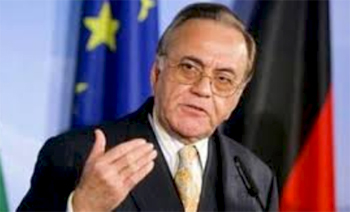New Delhi, Jul 7: Kashmir has a deep resonance inside Pakistan and the tense situation in the Valley acts as bait and encourages radical elements 'to wage jihad to liberate fellow Muslims', says former Pakistan foreign minister Khurshid Mahmud Kasuri.

"If that were not the case," he says, "there would be no willing recruits from among the masses to the jihadi cause." However, among influential sections of public opinion and in the corridors of power it was realised that Pakistan's policy of support to non-state actors had actually boomeranged on it, says the senior leader of Pakistan's Tehreek-e-Insaf party who has dealt with India-Pakistan relations.
On the Pakistan-India dynamics, he says, "Pakistan-India relationship does have an impact radicalising elements among Muslims in Pakistan. Kashmir has a deep resonance inside Pakistan. Furthermore, the tense situation in the Kashmir Valley also acts as bait and encourages radical elements ‘to wage jihad to liberate fellow Muslims'."
He feels normalisation of relations between Pakistan and India will help pluralistic and liberal forces in Pakistan besides helping the conditions of minorities in both countries. Kasuri is also of the opinion that notwithstanding the initial romance surrounding the Mujahideen activities, the West and particularly Pakistan continue to pay a heavy price for this jihad and both are still suffering from its blowback.
"Over time, the West and Pakistan have had to contend with increasing linkages between terrorist groups of different orientations. Pakistan also discovered, to its horror, that some of the groups fighting in Kashmir could just as easily attack its own civilians and security forces.
"In many cases, the intelligence and law enforcement agencies were also targeted. Public opinion in Pakistan began turning against the activities of violent groups for whatever cause," he writes in an article in the Equator Line magazine's latest issue, contributors to which are all Pakistanis. Kasuri says that there was a growing recognition among the middle-classes and major sections of the media that Kashmir and other issues with India could not be resolved by resorting to violence by non-state actors and although their activities definitely attracted a lot of international attention, it was equally clear after 9/11 that the international community had lost any appetite for such activities.
"It came to be realised that Pakistan and India would have to find a negotiated settlement to Kashmir and other outstanding issues between them. I do not wish to convey the impression that, at the time when I assumed office, the support for jihadi groups had evaporated among all sections of public opinion. Due to the staunch commitment of Pakistanis to the Kashmir cause, there will always be a minority opinion sympathising with the activities of the jihadis," he writes.
According to Kasuri, there are many reasons for the rise of fundamentalism in Pakistan and it may be helpful to look at the subject from at least four perspectives.
"First, Pakistan's political and constitutional struggle to create a new dispensation after Partition; this determined the role of the ulema allowing for its expansion under General Zia-ul-Haq. This, in turn, contributed later on to the strengthening of the fundamentalist forces.
"Second, the situation since 1979 following the Iranian Revolution, the invasion of Afghanistan by the Soviet Union and Pakistan's role in resisting it with the help of the entire Western world, China and the Islamic fraternity with Saudi Arabia taking a lead role (along with the general spread of radicalism throughout the Muslim world for various reasons - falling outside the scope of this article) greatly strengthened the fundamentalists and militants.
"Third, the Pakistan-India dynamic helped strengthen reactionary elements inside Pakistan at the expense of the liberals. The fourth factor we have to consider is the situation in Pakistan in the post Zarb-e-Azb operation by the Pakistan Army to clear the Federally Administered Tribal Areas (FATA) of the terrorists who had taken refuge there and created an infrastructure to support their activities," he writes.






Comments
Add new comment